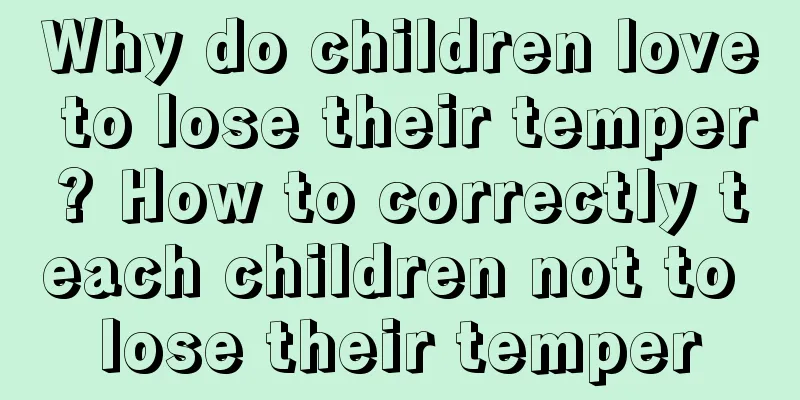How to quickly eliminate baby's bloating?

|
Baby flatulence is one of the most common problems for babies. How do new parents deal with these problems? Today, let's talk about the problem of baby flatulence. Check out the three main reasons for baby bloating1. Swallowing too much air When babies are fed with bottles, if they suck too quickly, they may inhale too much air. If the nipple hole of the bottle is not of the appropriate size or the bottle is tilted, air may be inhaled into the baby's stomach through the gap in the nipple. Excessive crying by babies can also easily lead to bloating. 2. Indigestion The accumulation of feces in the intestines causes the proliferation of gas-producing bad bacteria, or milk protein allergy, lactose intolerance, enteritis, etc. cause digestion and absorption problems, which can easily produce a large amount of gas. 3. Gastrointestinal motility disorders There are two types of problems: purely functional, called "pseudo-obstruction", and true lack of ganglia in the gastrointestinal tract, called "congenital megacolon". The severity of these problems varies, ranging from chronic constipation and bloating to severe vomiting, and can be temporary or lifelong. Attention, parents! Learn these countermeasures 1. Don’t let your baby be hungry for too long before feeding. If the baby is hungry for too long, he will suck too quickly and swallow a lot of air. So you should feed your baby on time, and after feeding, gently pat the baby's back to promote burping and discharge the gas in the stomach and intestines from the esophagus. 2. When the baby cries, parents should give more comfort It is easy for babies to get bloating when they cry. In this case, parents should give more comfort or hug them to avoid worsening of bloating by adjusting their emotions. 3. Massage your baby’s abdomen Massage the baby's abdomen more often, in a clockwise direction for 5 minutes. It is also helpful to use wind-repelling oil on the abdomen or cover it with a warm towel, which can help gastrointestinal motility and gas discharge to improve digestion and absorption. 4. Reduce the sugar content in breast milk If the sugar content in breast milk is too high, the sugar will ferment excessively in the baby's stomach, which can easily cause the baby to have intestinal bloating. At this time, the mother should pay attention to limiting her sugar intake. In addition, if she suspects that her food may cause the baby's bloating, then the breastfeeding mother should eliminate those suspicious foods, such as beans, corn, sweet potatoes, cauliflower and spicy foods, from the diet. 5. Artificial feeding prevents the baby from inhaling air For babies who are bottle-fed, you should make sure that the front end of the bottle mouth is filled with milk and that there is no slope to prevent the baby from inhaling air. For babies who are breastfed, if the baby's mouth is not properly positioned relative to the mother's breast when feeding, the baby may inhale too much air, resulting in burping or bloating. The correct posture is to have the baby's face facing the mother's breast to ensure that his mouth covers the nipple and areola. 6. Avoid eating foods that can cause bloating Certain solid foods may also cause burping and bloating. For example, whole grains and some vegetables such as pea paste and soybean paste contain fiber that can cause bloating. Kiwis, pears, pineapples, and fruit juices contain high concentrations of sugar, which can also cause bloating in infants and should be eaten less. 7. Seek medical attention promptly If your baby has abdominal distension accompanied by vomiting, loss of appetite, weight loss, difficulty passing gas through the anus, or even fever, bloody stools, or tenderness in the abdomen, or shortness of breath, or something like a lump can be felt in the abdomen, you should pay special attention and take your baby to the doctor for examination and treatment as soon as possible. Causes and solutions for abdominal bloatingBabies with bloating need a balanced diet and good eating habits. Do not let the baby be hungry for too long before feeding. You can do moderate abdominal massage to promote intestinal motility and gas discharge. If the baby's stomach is abnormally bloated, you need to seek medical attention in time. Using wind-repellent oil on the baby's abdomen and covering it with a warm towel can also help. These help gastrointestinal motility and gas discharge to improve digestion and absorption function. 1. Eat a balanced diet If the sugar content in breast milk is too high, the sugar will ferment excessively in the baby's stomach, which can easily cause the baby to have intestinal bloating. At this time, the mother should pay attention to limiting her sugar intake. In addition, if she suspects that her food may cause the baby's bloating, then the breastfeeding mother should eliminate those suspicious foods, such as beans, corn, sweet potatoes, cauliflower and spicy foods, from the diet. It is important to choose a suitable milk powder for your baby. The balanced formula milk powder with added β-vegetable oil (super high-quality affinity structural fat) is close to the structure of breast milk and promotes calcium and energy absorption. High-quality milk powder shows differences in its mixing stage. Mothers can distinguish them by the following methods: First, the powder is fine, loose, and has no lumps; second, mix it with 40° warm water to dissolve evenly; third, turn it upside down, roll the bottle with both hands, and there is no precipitation or wall hanging at the bottom of the upside-down bottle. No loss of nutrition, comprehensive and excellent absorption. At the same time, appropriate intake of probiotics can increase the intestinal barrier function, resist the colonization of foreign harmful bacteria in the intestine, inhibit the growth of harmful bacteria, regulate the baby's stomach and intestines, enhance the baby's resistance, and allow the baby to absorb better. 2. Develop eating habits Don't let your baby be hungry for too long before feeding. If your baby is hungry for too long, he will suck too quickly and swallow a lot of air. So you should feed your baby on time, and after feeding, gently pat your baby's back to promote burping and expel gas from the esophagus. 3. Abdominal massage Moderate massage can promote intestinal peristalsis and exhaust, thus relieving the baby's bloating. To do this, wash your hands, then use your palms to gently massage the baby's belly in a clockwise direction, centering on the baby's belly button. Massage for about 5 minutes each time. Your hands should be warm and the force should be moderate, otherwise your baby may feel uncomfortable. 4. Seek medical attention immediately if you have abnormal bloating In short, if the baby's belly is swollen and hard, and the baby looks very uncomfortable, and is usually vomiting or wheezing, it is even worse. If you encounter the following abdominal distension, parents should pay special attention and take the baby to the doctor for examination and treatment as soon as possible: (1) The baby has abdominal distension accompanied by vomiting, poor appetite (less than half of the usual amount and decreasing), anemia, weight loss, and even fever and bloody stools. (2) The belly cannot be touched at all. The baby will feel pain or cry if touched. (3) Combined with shortness of breath. (4) A hard mass similar to a lump can be felt in the abdomen. 5. Home care It is also helpful to use wind-repellent oil on the abdomen and cover it with a warm towel. These help gastrointestinal motility and gas discharge to improve digestion and absorption function. I have 5 ways to prevent baby bloating1. When the baby cries, it is easy to get bloated. In this case, parents should give more comfort or hug him to avoid worsening bloating by adjusting his mood. 2. Don't let your baby be hungry for too long before feeding. If your baby is hungry for too long, he will suck too quickly and swallow a lot of air. So you should feed your baby on time and encourage your baby to expel gas properly after feeding. 3. Massage your baby's abdomen more often, which will help gastrointestinal motility and gas discharge, thereby improving digestion and absorption. 4. When feeding, be sure to ensure that the milk fills the front end of the bottle nozzle and that there is no slope to prevent the baby from inhaling air. 5. Temporarily stop eating foods that easily ferment and produce gas in the digestive tract, such as sweet potatoes, melons, etc. |
<<: Developmental indicators of 1-year-old babies Developmental standards of 1-year-old babies
>>: 18-month-old baby development indicators 18-month-old baby development standards
Recommend
What do newborn babies need to supplement?
Many newborn babies need to supplement some vitam...
How to get rid of stretch marks during the confinement period? What can I eat during the confinement period to get rid of stretch marks?
Hateful stretch marks seriously affect the beauty...
Can I drink Red Bull during childbirth? Is it useful to drink Red Bull during childbirth?
Many pregnant women prepare Red Bull and chocolat...
Is it necessary to use morning urine for pregnancy test? Can urine from other times be used for pregnancy test?
When using a pregnancy test stick to detect pregn...
What causes hair loss during pregnancy? What to do during pregnancy
There are already a lot of things added to the pr...
Can the gender of a test-tube baby be determined? Can the gender of a test-tube baby be selected?
With the opening of the second-child policy, more...
Can raw pumpkin seeds cure roundworms? How to eat raw pumpkin seeds to kill worms?
Can raw pumpkin seeds cure roundworms? Today, I w...
How much is a box of Tianxi Pills? How much is a bottle of Tianxi Pills?
Many women who are eager to have children will ch...
What is the problem with children's leg clamping syndrome? What should I do if children have leg clamping syndrome?
After reading this article, I believe you may hav...
At what age can a baby use a pacifier? Can a baby sleep with a pacifier in his mouth?
The function of a pacifier is to soothe the baby&...
What is the standard height and weight for a 7-year-old boy? What is the standard height and weight for a 7-year-old girl?
Many parents want to know what are the normal hei...
What is fetal toxin? What are the harms of fetal toxin?
Everyone must have heard of fetal toxicity in lif...
What foods and fruits can I eat after a miscarriage?
Abortion is a sad and harmful thing for the mothe...
Can babies eat dragon fruit? Taboos of eating dragon fruit for babies
Dragon fruit is a very good fruit, which is rich ...
What are the consequences of a child's severe calcium deficiency?
Calcium deficiency in children is a relatively co...









